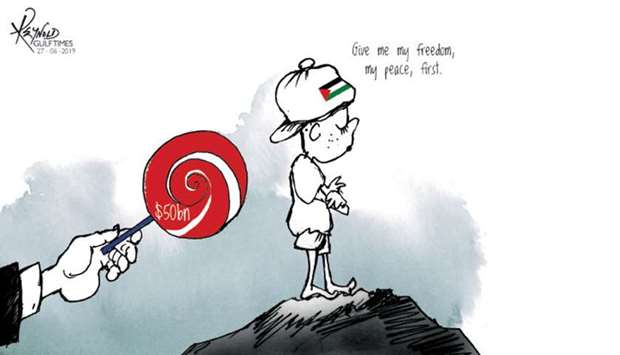A US-sponsored summit on Palestinian economic development focused on the need for job-generating investments on Wednesday and peace in the West Bank and Gaza, as well as governance and accountability.
The meeting comes days after the White House unveiled the economic portion of its so-called "Deal of the Century," the long-awaited initiative led by Jared Kushner, US President Donald Trump's adviser and son-in-law, and US special envoy Jason Greenblatt.
Washington said the plan could generate $50bn in investment over 10 years for the Palestinian economy.
Some panellists on the second and final day of the conference in Manama, mentioned peace as a condition for the success of the plan, yet without focusing on issues relating to politics or the conflict with Israel.
International Monetary Fund (IMF) Managing Director Christine Lagarde said growth is contracting in the Palestinian Territories, with a 1.6% drop forecast in 2019.
With an unemployment rate of 30% in the West Bank and 50% in Gaza and a growing population, expected to double from 5 to 10mn in 2050, investments should focus on generating jobs and tackling a lack of skills needed for the market.
Agriculture, tourism, construction and infrastructure are sectors identified to "absorb a lot of labour," Lagarde added.
Besides all of this, a "satisfactory peace" is needed for prosperity, she added.
Other panellists focused on the need for governance, accountability and the rule of law for businesses to be able to work in the Palestinian Territories.
World Bank President David Malpass said electricity, water and waste water treatment are "pressing needs" as well as education and skills required by the private sector.
The meeting kicked off in the Bahraini capital on Tuesday, as part of a wider US initiative to resolve the Israeli-Palestinian conflict.
Kushner's plan aims to create 1mn Palestinian jobs over the time frame and finance a transportation corridor between the West Bank and Gaza Strip, which remain separated by Israel.
It also seeks to improve infrastructure, tourism and agriculture, set up educational projects for Palestinians in the West Bank and Gaza and introduce other projects in Egypt, Lebanon and Jordan.
Palestinian leaders announced they were boycotting the Bahraini meeting, dubbed "Peace to Prosperity Workshop," while the Israeli government was not invited.
Washington said the plan could generate $50bn in investment over 10 years for the Palestinian economy.
Some panellists on the second and final day of the conference in Manama, mentioned peace as a condition for the success of the plan, yet without focusing on issues relating to politics or the conflict with Israel.
International Monetary Fund (IMF) Managing Director Christine Lagarde said growth is contracting in the Palestinian Territories, with a 1.6% drop forecast in 2019.
With an unemployment rate of 30% in the West Bank and 50% in Gaza and a growing population, expected to double from 5 to 10mn in 2050, investments should focus on generating jobs and tackling a lack of skills needed for the market.
Agriculture, tourism, construction and infrastructure are sectors identified to "absorb a lot of labour," Lagarde added.
Besides all of this, a "satisfactory peace" is needed for prosperity, she added.
Other panellists focused on the need for governance, accountability and the rule of law for businesses to be able to work in the Palestinian Territories.
World Bank President David Malpass said electricity, water and waste water treatment are "pressing needs" as well as education and skills required by the private sector.
The meeting kicked off in the Bahraini capital on Tuesday, as part of a wider US initiative to resolve the Israeli-Palestinian conflict.
Kushner's plan aims to create 1mn Palestinian jobs over the time frame and finance a transportation corridor between the West Bank and Gaza Strip, which remain separated by Israel.
It also seeks to improve infrastructure, tourism and agriculture, set up educational projects for Palestinians in the West Bank and Gaza and introduce other projects in Egypt, Lebanon and Jordan.
Palestinian leaders announced they were boycotting the Bahraini meeting, dubbed "Peace to Prosperity Workshop," while the Israeli government was not invited.

